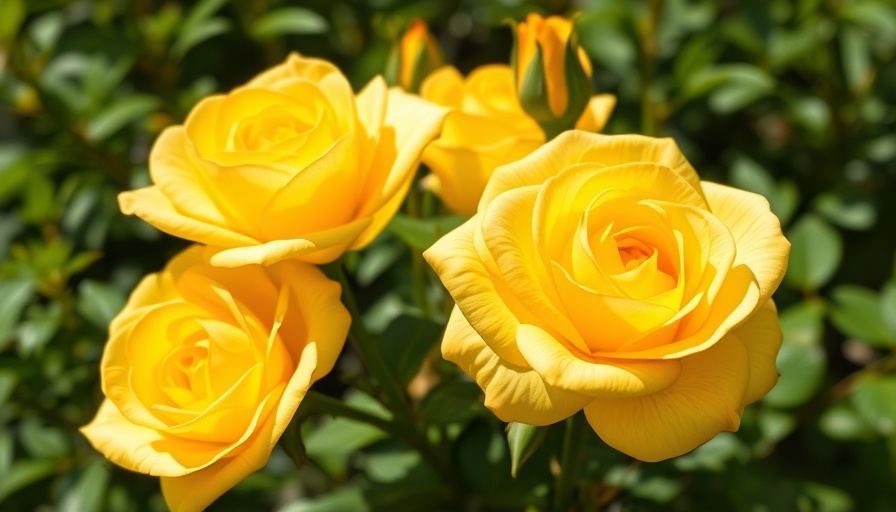
Understanding Iron Deficiency: A Gardener's Challenge
Gardening is a fulfilling endeavor that nurtures not only our plants but also our spirits. However, every gardener eventually faces challenges, one of which is the nutritional needs of plants. Among these concerns, iron deficiency stands out, particularly for those who cherish roses. Identifying and correcting iron deficiency in roses can revive their health and beauty, offering much satisfaction to urban and suburban gardeners alike.
The Importance of Iron in Plant Health
Iron serves as a crucial micronutrient, vital for various functions within roses. It plays a central role in the formation of chlorophyll, the green pigment necessary for photosynthesis. Without adequate iron, roses struggle to thrive, manifesting signs that may at first seem ambiguous but are ultimately telling of their health. Young leaves, devoid of sufficient iron, will develop a striking visual symptom known as chlorosis—where green veins stand out against a yellow backdrop. This characteristic shift in leaf color serves as a clear signal to gardeners.
Symptoms of Iron Deficiency: Spotting the Issue
Recognizing the signs of this deficiency is essential, especially since the symptoms often do not manifest until the growing season's new growth begins to emerge. Gardeners would typically find that the yellowing is confined to the newer growth, while older leaves retain their color. This immobile nature of iron within the plant complicates recovery, as long-standing deficiencies may need immediate intervention upon observation of these symptoms.
Steps to Treat Iron Deficiency in Roses
Addressing iron deficiency isn't just about identifying it; it’s also about taking effective action to restore health to your roses. Here are several strategies:
- Soil Testing: Assess the pH levels of your soil. Iron availability decreases in soils that are too alkaline (above 7.0). A slightly acidic soil (pH 6.0-6.5) is ideal for roses to absorb nutrients efficiently.
- Chelated Iron Products: These products come in liquid and granule forms and are easily taken up by plants. Applying chelated iron solutions can quickly address deficiencies. Be sure to follow instructions for application rates.
- Organic Remedies: Incorporating organic matter such as compost or well-rotted manure improves soil structure and nutrient availability. Additionally, using iron-rich organic fertilizers enhances nutrient uptake.
- Foliar Application: For immediate interventions, foliar sprays containing iron can provide fast relief to plants showing symptoms, delivering the nutrient directly to the leaves.
- Maintain Good Practices: Ensure consistent care through proper watering and mulching, which helps maintain soil moisture and temperature, further supporting nutrient absorption.
The Emotional Reward of Gardening
For many gardeners, nurturing roses and witnessing their recovery from iron deficiency embodies the essence of what gardening represents. It’s not merely about growing plants; it’s a journey of patience and hope. Each successful treatment not only restores the physical beauty of the plants but also strengthens the emotional bond between gardener and garden. When those vibrant blooms reappear, it's a reminder of the rewards that accompany diligent care and attention.
Gardening Beyond Roses: Embracing Diversity
While focusing on iron deficiency in roses is essential, it’s also a great opportunity for gardeners to transition into ensuring the overall health of their entire garden. Much like roses, other plants also rely on iron. Expanding your knowledge about diverse nutrient requirements can lead to a thriving ecosystem in your garden. Explore practical gardening hacks that integrate pest-resistant plants and diverse soil enhancement techniques, contributing to both health and sustainability.
As you nurture your roses back to health, take a moment to reflect on how gardening fosters community and self-sufficiency. This journey invites discussions with fellow gardeners, encouraging knowledge sharing and collaboration.
In conclusion, identifying and correcting iron deficiency in roses is not just a technical challenge; it is a holistic experience that underscores the joy of gardening and its benefits. Equip yourself with knowledge and practical insights to enhance your gardening adventure. Engage now in conversations with your local gardening community or resources; together, we can cultivate beauty in every backyard.
 Add Row
Add Row  Add
Add 




 Add Row
Add Row  Add
Add 

Write A Comment